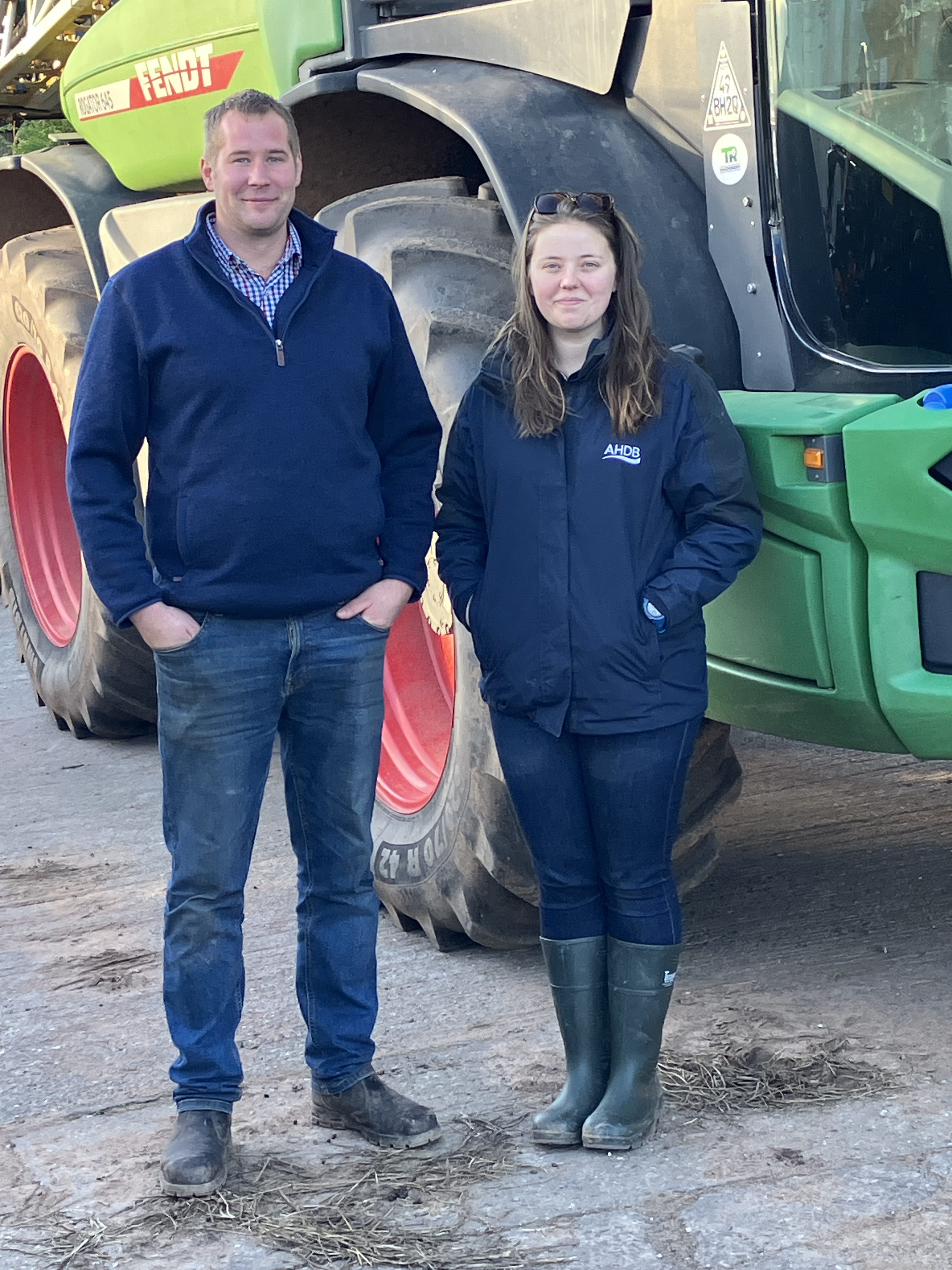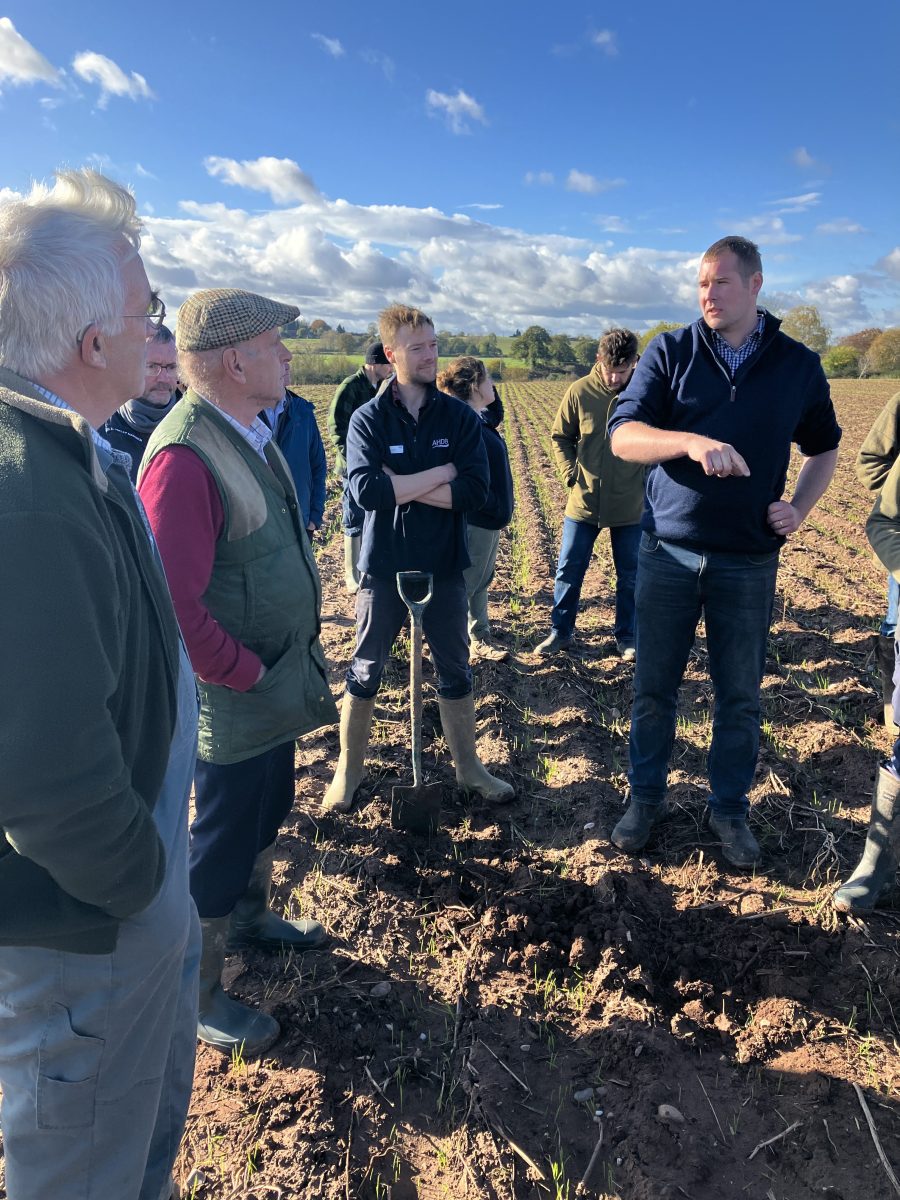Meet Jack Houghton – the first West Midlands monitor farmer to be appointed post-pandemic. A young farm manager in his early thirties, he says his driver is to encourage more people to join the industry. “I’m often the youngest in the room. That has to change so that farming has a future.
“I’m not one for sitting around talking about new ideas – I want to get out and try them. If it goes wrong, it goes wrong, but you always learn something. And if I can share that learning, it’s even more useful. That’s why I’m excited about managing an AHDB Monitor Farm,” he says.
Jack runs DW Burton Farms in Wolverhampton – just over 800ha of owner-occupied land and farming agreements. His goals include stabilising the business, securing long-term tenancies and contract farming agreements, reducing inorganic inputs, and building soil organic matter.

Jack Houghton, farm manager, Wolverhampton Monitor Farm and Dr Alex Ansell, AHDB Knowledge Exchange manager
On-hand support
But how does being a monitor farmer contribute towards those valiant ambitions? Dr Alex Ansell is AHDB’s cereals & oilseeds knowledge exchange manager for the West Midlands and Wales and will be supporting Jack as he undertakes practical trials, with results shared with local farmers at networking events.
Alex says the three-year programme has strong core principles. “It’s a farmer-led, farmer-driven project with business efficiency and benchmarking at the heart of its activity. It takes place on commercial farms providing a hands-on approach to personal and business development. This makes it attractive to other members of the farming community,” she explains.
What is a Monitor Farm?
The Monitor Farm concept first originated in New Zealand, was adopted in Scotland in 2003 and rolled out across England, Northern Ireland and Wales in 2014.
How it works is that a monitor farmer partners with their local AHDB knowledge exchange manager to host about five meetings each year. These farmer-led meetings provide the opportunity to find and share challenges and solutions, as well as spend time socialising with peers.
During the three years, every aspect of a farm business is scrutinised – with the host farm serving as a case study – from soil management to machinery policy, but with cost implications to the farm business always taking centre stage.

Farm walk during the launch of Wolverhampton Monitor Farm
Delivering results
Alex says with a focus on making real developments in business management, improving productivity, competitiveness and environmental management, it’s about embracing innovative ideas, all with the support of AHDB and industry experts.
“It takes a special mix of qualities to be a monitor farmer. Jack is keen to try out new arable farming methods in practical ways, and to share the results with others so they can adopt successful techniques,” she says.
As for AHDB, Alex stresses that knowledge exchange is the backbone of the levy board’s offer to growers. “The knowledge exchange team is a key part of the service AHDB provides, facilitating peer-to-peer learning, carrying out on-farm research and connecting growers with the best information and expertise.
“This is enabled by our network of Strategic Farms, Monitor Farms and Arable Business Groups. With several of our Monitor Farms concluding in most regions this year, we’re eager to recruit more farmers to be involved to continue the good work, which is why we’re undertaking the recruitment campaign,” she concludes.
AHDB is recruiting in the following areas – Lancashire or Cumbria; North Yorkshire, Durham or Northumberland; Warwickshire, Worcestershire or Herefordshire; Lincolnshire; Essex; Devon or Cornwall; Oxfordshire, Hampshire, Surrey, Sussex or Kent; Wales (all). The closing date for applications is 1 March 2024.
For more information and to apply today, click here




